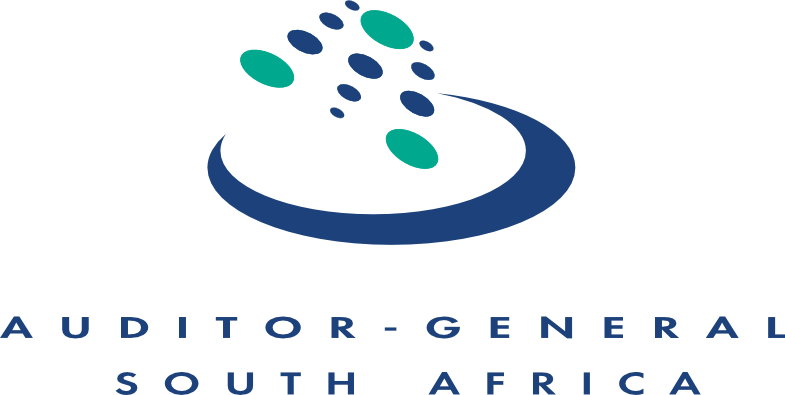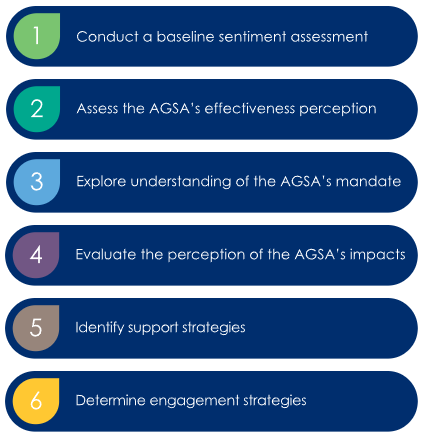As an organisation, our influence plays a key role in galvanising our stakeholders to work together and help create a positive shift in the public sector’s performance culture. In 2023-24, we continued to invest time and training efforts on helping our employees, especially within the audit teams, improve their influence skills. We also developed frameworks and policies to support these influence efforts. This included socialising both our internal and external stakeholders, especially those in the accountability ecosystem, on these frameworks and their roles and responsibilities in relation to them. Our accountability ecosystem roleplayers in the environments are shown below.
Accountability ecosystem
- Broad-based, effective network of stakeholders that drive and deepen public sector accountability.
- Each plays a role in driving principles of strong Pati indicators in the public sector.
- Failure by any stakeholder to effectively play their unique role has a detrimental impact on the effectiveness of the whole system.
- Therefore, all stakeholders must play their part.
Accountability ecosystem effectiveness
The target for the 2023-24 year was to produce an accountability ecosystem effectiveness report (focusing on key themes) to assess the impact of our influence work while also identifying areas that need to be strengthened. The report was finalised and shared with the auditor-general for her review after year-end. While the completion and submission of the report came after year-end (meaning we only partially achieved our target), there were enough insights in the report to be of value to the audit teams on the ground, especially as they focus on elevating our influence tactics for 2024-25.
Our audit leaders have engaged with the report and spent the first quarter of 2024-25 working to elevate those aspects that are relevant to them and their accountability ecosystem members.
Going forward, these will be used to craft clear influence approaches for the next two years, focused on the following:
- How we will collaborate with those accountability ecosystem members that are currently active and effective (understanding their roles and executing them accordingly, including their collaboration with the AGSA).
- How we will close the gaps with the members that are not executing their accountability ecosystem roles and responsibilities as they should.
- How we will maintain the momentum on both of the above as we go about our stakeholder influence work in the coming years.
AGSA stakeholder perception survey
As the supreme audit institution of the country, we play a crucial role in strengthening our country’s democracy by enabling oversight, accountability and governance in the public sector through auditing. Our strategy focuses on building, preserving and leveraging public confidence and stakeholder trust to drive receptiveness and responsiveness to our messages, fostering action and advocacy. To achieve these goals, we conducted an independently run stakeholder survey to better understand our stakeholder needs and their experiences with us and our products.
The objective was to help us add more value to them in future and enhance our responsiveness to their needs.
This was all with the aim of fostering better long- term relationships with both our accountability ecosystem and culture shift coalition stakeholders to collectively work towards improving auditee performance and, by extension, service delivery to the South African people.
The survey aimed to achieve the following objectives:
In 2024-25, we will implement an action plan that we developed to address the areas of improvement. This plan will include annual auditee surveys and is a key part of our stakeholder influence efforts to advance the objectives of the #cultureshift2030 strategy.
Achievement of outcomes targeted in stakeholder programme
Our engagement efforts have been wide-ranging, reaching stakeholders across key value chains and clusters. Notably, we have expanded our reach to stakeholders beyond our usual engagements, creating greater awareness and encouraging collaboration for impactful change.
Below are some examples of the successes that our influence engagements have yielded:
INFLUENCE REVISED FUNDING MODALITIES: HIGHER EDUCATION AND TRAINING SECTOR
The higher education and training sector is meant to contribute to skills development and job creation and, as a result, is a strategic priority area for government. However many higher education and training initiatives being rolled out nationally, the skills challenge and unemployment among tertiary graduates persists.
We established through our audits that the significant amounts earmarked for higher education were not spent on scarce and in- demand skills that can accelerate economic growth. In addition, the systems of sector education and training authorities (Setas) are not interlinked resulting in duplication of efforts including interventions that are focusing on the same learners.
As part of our influence work, we held engagements with the executive authority in higher education and training and shared our insights from our audit work, which could assist the department to improve its operating approach.
Following the elevation of these insights (and our related recommendations on them), the minister announced that the department would reconsider the comprehensive funding model, particularly for NSFAS, to prioritise funding efforts towards scarce and in-demand skills.
The department also responded positively to our recommendation to integrate setas systems to enable integrated planning and streamlined operating processes. The Setas have begun to focus their efforts on finding IT systems to link their operations and collecting repositioning information to ensure collective impact. These efforts will go a long way towards addressing the skills gap and unemployment among graduates in the country.
INFLUENCE EFFORTS AND SUCCESSES WITH EXECUTIVES AND COORDINATING INSTITUTIONS
Our teams continued to raise concerns directly with the Presidency, Department of Planning and Monitoring and Cogta highlighting the detrimental effects of delayed capacity building and, lack of strategic integration of projects, ineffective presidential task teams, and delays in implementing government Medium-term Strategic Framework (MTSF) priorities. Following our engagements, these efforts saw relatively quick action plan, as Cabinet began working on a comprehensive improvement plan to tackle coordination challenges across government sectors, including directives by DPME to guide the planning and development of annual performance plans in line with MTSF.
In the municipal space, through persistent influence engagements with accounting officers, coordinating institutions, such as provincial treasures, and auditees’ oversight structures, we saw a marked improvement in the submission of financial statements by the legislated deadline. These improvements were also due to accounting officers responding positively to our MI notifications on the matter of on-time submission of annual financial statements, as well as provincial government supporting municipalities to act on their submission commitments. This is a clear example of the improvements we can see within auditees when all stakeholders within the accountability ecosystem play their part.
INFLUENCE EFFORTS AND SUCCESSES IN INFRASTRUCTURE SECTOR
Extensive effort by both our national and provincial teams advanced the infrastructure sector by showcasing our infrastructure insight and working with stakeholders to take decisive action to address the lack of planning and coordination, weak project management and financial loss due to projects going beyond contractual periods.
We influenced accounting officers and authorities and the members of executive committees across the provinces to prioritise the implementation of our recommendations. In some provinces, this led to schools being operational again and some municipalities submitting plans on maintenance and upgrades to improve the state of water infrastructure.
Since we shared our insights from occupational health and safety assessments, emphasising the department’s efforts to implement processes aimed at advancing the realisation of ideal clinics and hospitals, we have observed a slight improvement in occupational health and safety practices, particularly at Charlotte Maxeke Johannesburg Academic Hospital, with fewer defects and security concerns compared to the previous year.
COLLABORATING WITH CIVIL SOCIETY ORGANISATIONS
Throughout the year, we focused on increasing engagement with CSOs to strengthen audit risk assessments and reinforce audit messaging.
Significant progress was made, as evidenced by accelerated progress and strong engagement with several influential CSOs.
Furthermore, the execution of all actions outlined in the CSO implementation plan established a successful trajectory for the AGSA-CSO partnership programme. The year saw significant progress in improving engagement with CSOs across various sectors and forums. Key achievements included convening strategic meetings with forum and sector leaders to advocate for CSO inclusion, developing tailored engagement plans for sector and forum collaborations, and establishing comprehensive reporting mechanisms to monitor CSO engagements. Soliciting feedback on the efficacy of our CSO engagement facilitated iterative improvements, while initiatives like webinars and the dissemination of updated frameworks via the intranet page improved AGSA-CSO accessibility and collaboration.
Our influence extended to significant and extensive engagements with the Asivikelane initiative on the critical aspect of basic service delivery in metros. Asivikelane is an initiative that convenes multi-stakeholder hubs of informal settlement residents, government officials, community organisations and other stakeholders, such as ourselves, as the national audit office, and training colleges to collectively deal with the service delivery issues experienced by informal settlement residents. This led to them collaborating on onsite inspections in informal settlements and a focus on exploring practical solutions for metros to tackle issues related to infrastructure maintenance to create meaningful and sustainable improvements in basic service delivery.
Looking ahead, the AGSA is committed to refining its approach to CSO engagements, as well as ensuring ongoing optimisation and risk mitigation, to uphold the pillars of accountability, transparency and integrity in its operations.
Our international influence
During 2023-24, we continued our efforts to strengthen our influence in the international space. Our impact in the Intosai capacity development community is good, with the CBC taking a leadership role to coordinate and influence the capacity development work plans of all the major players in this community.
For the first time, Intosai adopted a consolidated operational plan for capacity development for 2023 to 2025. The CBC’s influence in elevating topics that affect supreme audit institutions such as competency-based professional development, quality management and unpacking the concept of the relevance of auditing is clearly visible in the 2023 Intosai Global Stocktake Report that will inform a first baseline assessment of this operational plan later in 2024.
Through our CBC leadership, we also increased our visibility as a leader in standard-setting. We played a key role in finalising the development plan for standards for the next three years, with emphasis on the need to refine work at the level of organisational principles in the Intosai framework of professional pronouncements, and on bringing order to the way that Intosai thinks about providing guidance on executing audits in the global community. Further indications of growth in this area include research on behalf of supreme audit institutions in the small island development states and in complex and challenging circumstances, and evaluating the appropriateness of auditing standards for this community.
We were successful in taking on new international audits that enhanced exposure opportunities for our audit teams. These included the audit of the United Nations Educational, Scientific and Cultural Organisation (Unesco), the International Centre for Genetic Engineering and Biotechnology (ICGEB) and the African Organisation of Public Accounts Committees (Afropac).This commitment reiterates one of our key employee value propositions – to provide meaningful career development opportunities.
As a key roleplayer in the United Nations Convention against Corruption (UNCAC), our influence achieved the indicator that we, as a supreme audit institution, are increasingly active in driving the message of clean administration internationally.
Conclusion
In 2023-24, we improved our influence efforts through a concerted effort to upskill our teams on the importance and practice of engaging for influence. As a result, we had successes in a number of auditee and accountability ecosystems, as the examples cited earlier demonstrate. While we acknowledge and celebrate these successes, we also understand that much remains to be done, both internally (continuing to enhance our influence capabilities) and externally (influencing auditees to be more responsive to our insights and recommendations).
In 2024-25, we will implement an action plan aimed at addressing the influence areas of improvement that emerged from the public perception survey. The plan will include annual auditee surveys to ensure that any improvement initiatives we develop always include auditees as our key stakeholders.



